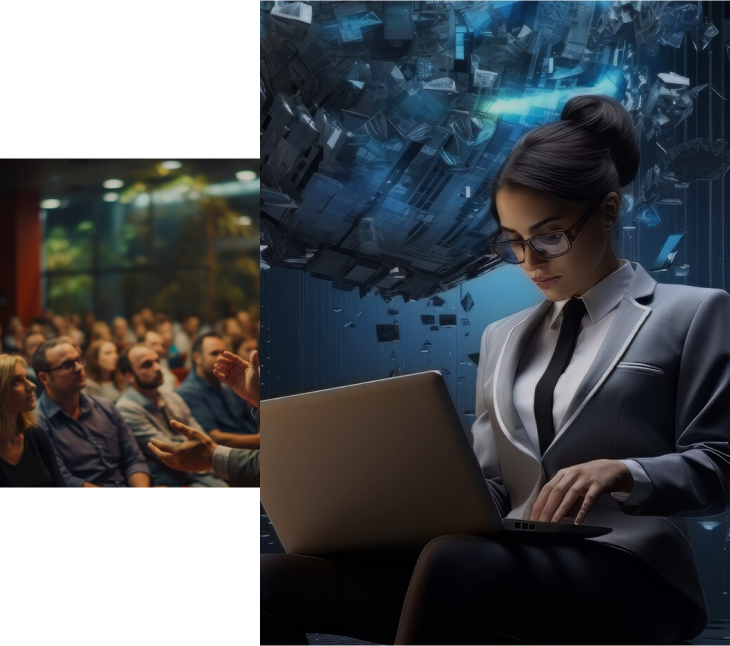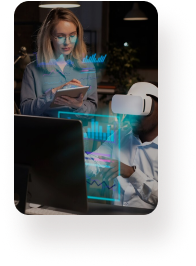AI-Driven Mastery in NavigatingUnstructured
Legal Textsfrom extensive documents
- 800+ Clients
- 200K+ legal documents
- 1K+ document types
- 500K+ relevant keywords

Our esteemed client, a prominent legal firm, grappled with the formidable task of managing and extracting valuable insights from an extensive repository of over 200,000 legal documents. Catering to the diverse needs of 800+ clients across a spectrum of legal matters, the firm faced intricacies in data retrieval and case preparation within the vast landscape of legal document management.
In navigating the complexities of their operations, the need for an advanced AI solution became evident.
The firm sought a sophisticated system to streamline the extraction of nuanced legal information and retrieve relevant documents efficiently. The challenge lay in distilling insights from a diverse range of document types, exceeding 1,000 variations, and deploying a comprehensive repository of over 500,000 keywords.
Business Problems
Manual Search Complexity
Manual searches within an extensive document repository were time-consuming, hindering the efficiency of legal operations.
Inefficient Data Retrieval
Extracting detailed information from diverse document types, such as PDFs, Word files, Excel sheets, and images, proved cumbersome.
Conventional AI Constraints
Generic AI solutions failed to comprehend and respond to the intricacies of legal data fed into the system.

Lack of Specificity
Existing AI models lacked specificity, often generating generic responses that were not tailored to the nuances of legal queries.
Navigating Legal Jargon
Traditional systems struggled to interpret and respond to legal jargon, impacting the accuracy of retrieved information.
Complexity in Legal Entity Searches
Traditional systems were not adept at smart searches for legal entities, causing inefficiencies in retrieving pertinent information.
Hidden Brains Approach / Value Additions

Tailored AI Assistance
Implementation of a private AI assistant customized to interpret and respond to specific legal data fed into the system.
Domain-Centric Model Configuration
We undertook an in-depth analysis of the legal domain, fine-tuning models to effectively interpret and respond to complex queries with accuracy.

Data Privacy Assurance
Recognizing the sensitivity of legal information, we prioritize data privacy through deployment of models on private clouds, servers, or intranets.
Image Text Extraction
Capability to extract text from images, enriching search capabilities without venturing into complex object recognition.
Hidden Brains Approach / Value Additions

Comprehensive Pre-Processing Engine
From categorizing data types to employing Optical Character Recognition (OCR) for image PDFs, we ensured a robust data abstraction technique.
LLM Integration
This integration enhances clarity and context-aware responses in generating precise legal information.

Keyword-Based Search Optimization
Incorporation of optimized keyword-based search algorithms for swift and precise data retrieval.

Continuous Model Refinement
Regular fine-tuning sessions address challenges in adapting to dynamic legal language and context-aware responses.
RAG Models Expertise
Optimizing RAG Models ensures dynamic and context-aware responses to legal queries, enhancing the overall efficacy of the solution.

Comprehensive Global Search
Robust global search functionality powered by Natural Language Processing (NLP) that enables precise searches based on legal keywords within document content.
Hybrid Training Approach
Simultaneous use of OpenAI API and a proprietary model, offering a flexible solution balancing data privacy and cost considerations.
Key Features
Role-Based Access
Control (RBAC)
Tailored AI Assistant grants granular control over access to different features and functionalities. Legal staff benefit from role-based permissions, ensuring a secure and streamlined workflow.
Workflow
Management
The solution offers a seamless workflow management system, allowing legal professionals to handle document processes efficiently. From creation to approval, the platform simplifies the entire document lifecycle.
Advanced Search
Capabilities
Empowered by a robust AI-driven search engine, legal practitioners can perform intricate searches within the extensive document database. The system intelligently understands natural language queries, significantly enhancing search precision.
Approval
Mechanism
Integrated approval workflows facilitate smooth collaboration within the legal team. The solution ensures that all necessary approvals are obtained in a structured and timely manner.
Document
Categorization
The solution automatically categorizes documents into predefined types, offering a structured approach to document management. This categorization enhances organization and simplifies retrieval.
User-Friendly
Interface
The user interface is designed with legal professionals in mind, ensuring ease of use. With an intuitive dashboard, staff can seamlessly navigate through tasks, approvals, and searches.
Challenges

Model Configuration Complexity
Fine-tuning the model for accuracy, especially with legal data intricacies, posed challenges in achieving optimal performance.
Training Model Complexity
Configuring the model, elucidating its functions through Natural Language Processing (NLP), and maintaining accuracy proved complex, particularly for custom models.
Interpreting Legal Variability
Navigating the variability in legal language and contexts, requiring continuous refinement to handle diverse case scenarios.
RAG Models Integration
Challenges in seamlessly integrating RAG (Retrieve, Answer, Generate) Models for dynamic and context-aware responses.
Cost Considerations
Balancing the cost of utilizing OpenAI API versus deploying a GPU-based model, with the latter incurring a significant monthly expense.
Ensuring Privacy in Hybrid Approach
Balancing the advantages of hybrid training with the necessity to safeguard sensitive legal information.
Ongoing Model Adaptation
The need for continuous adaptation of models to evolving legal language, ensuring relevance and accuracy in responses.

Key Results
Efficient Case Creation
The AI Assistant has significantly expedited case creation, particularly for legal professionals dealing with dispute or property cases.
Streamlined Data Abstraction
The system facilitates seamless data abstraction, reducing the manual effort required for legal document preparation.
Enhanced Search Precision
Improved precision in search results, allowing legal practitioners to access specific information with minimal effort.
Privacy Assurance
Successfully ensuring the privacy of sensitive legal information in the hybrid training approach.
Technology Stack
Backend
- Python
- Flask
- LLM
Frontend
- ReactJS
Server-side
- NodeJS
Lessons Learnt
Continuous Fine-Tuning
Regular fine-tuning of the model is imperative to uphold accuracy and relevance, especially in the context of evolving legal data.

RAG Models Adaptability
The integration of RAG Models requires ongoing adaptation to ensure their effectiveness in generating accurate responses.

Hybrid Approach
Flexibility
Balancing the advantages of a hybrid training approach with the necessity to safeguard sensitive legal information.
Balancing Cost and
Performance
The perpetual challenge of balancing the costs associated with GPU utilization against the need for optimal model performance.
Adapting to Legal Entity
Variability
Enhancing the system's capability to accurately identify and retrieve information related to diverse legal entities.
Optimizing Keyword
Algorithms
Continuous optimization of keyword-based search algorithms to ensure swift and precise data retrieval.

Future Plans
Deployment
Flexibility
Plans to ensure the system's adaptability to private clouds, servers, or intranets for a tailored infrastructure.

Advanced
Legal Features
Continuous enhancement of features, potentially incorporating more advanced AI/ML technologies tailored for the legal landscape.

RAG Models
Refinement
Ongoing refinement and optimization of RAG Models for increased efficiency in dynamic legal contexts.

Enhanced NLP
Integration
Continuous improvements in NLP integration to ensure the system's understanding and response to evolving legal language nuances.

Privacy-Centric
Innovations
Innovations to further enhance data privacy measures, aligning with the sensitivity of legal information handled by the system.

User-Driven Feature
Development
Collaboration with legal professionals for user-driven feature development, ensuring the system remains aligned with evolving industry needs.
